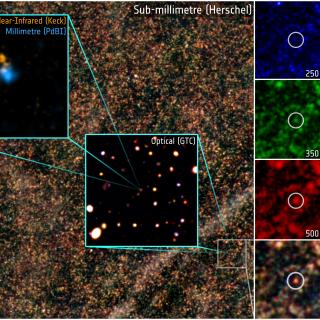Bibcode
Shupe, David L.; Rowan-Robinson, Michael; Lonsdale, Carol J.; Masci, Frank; Evans, Tracey; Fang, Fan; Oliver, Sebastian; Vaccari, Mattia; Rodighiero, Giulia; Padgett, Deborah; Surace, Jason A.; Xu, C. Kevin; Berta, Stefano; Pozzi, Francesca; Franceschini, Alberto; Babbedge, Thomas; Gonzales-Solares, Eduardo; Siana, Brian D.; Farrah, Duncan; Frayer, David T.; Smith, H. E.; Polletta, Maria; Owen, Frazer; Pérez-Fournon, Ismael
Bibliographical reference
The Astronomical Journal, Volume 135, Issue 3, pp. 1050-1056 (2008).
Advertised on:
3
2008
Citations
53
Refereed citations
49
Description
This paper presents galaxy source counts at 24 μm in the six Spitzer
Wide-field InfraRed Extragalactic (SWIRE) fields. The source counts are
compared to counts in other fields, and to model predictions that have
been updated since the launch of Spitzer. This analysis confirms a very
steep rise in the Euclidean-normalized differential number counts
between 2 mJy and 0.3 mJy. Variations in the counts between fields show
the effects of sample variance in the flux range of 0.5-10 mJy, up to
100% larger than Poisson errors. Nonetheless, a "shoulder" in the
normalized counts persists at around 3 mJy. The peak of the normalized
counts at 0.3 mJy is higher and narrower than most models predict. In
the ELAIS N1 field, the 24 μm data are combined with Spitzer-IRAC
data and five-band optical imaging, and these band-merged data are fit
with photometric redshift templates. Above 1 mJy the counts are
dominated by galaxies at z < 0.3. By 300 μJy, about 25% are
between z ~ 0.3 and 0.8, and a significant fraction are at z ~ 1.3-2. At
low redshifts the counts are dominated by spirals, and starbursts rise
in number density to outnumber the spirals' contribution to the counts
below 1 mJy.
Related projects

Formation and Evolution of Galaxies: Observations in Infrared and other Wavelengths
This IAC research group carries out several extragalactic projects in different spectral ranges, using space as well as ground-based telescopes, to study the cosmological evolution of galaxies and the origin of nuclear activity in active galaxies. The group is a member of the international consortium which built the SPIRE instrument for the
Ismael
Pérez Fournon